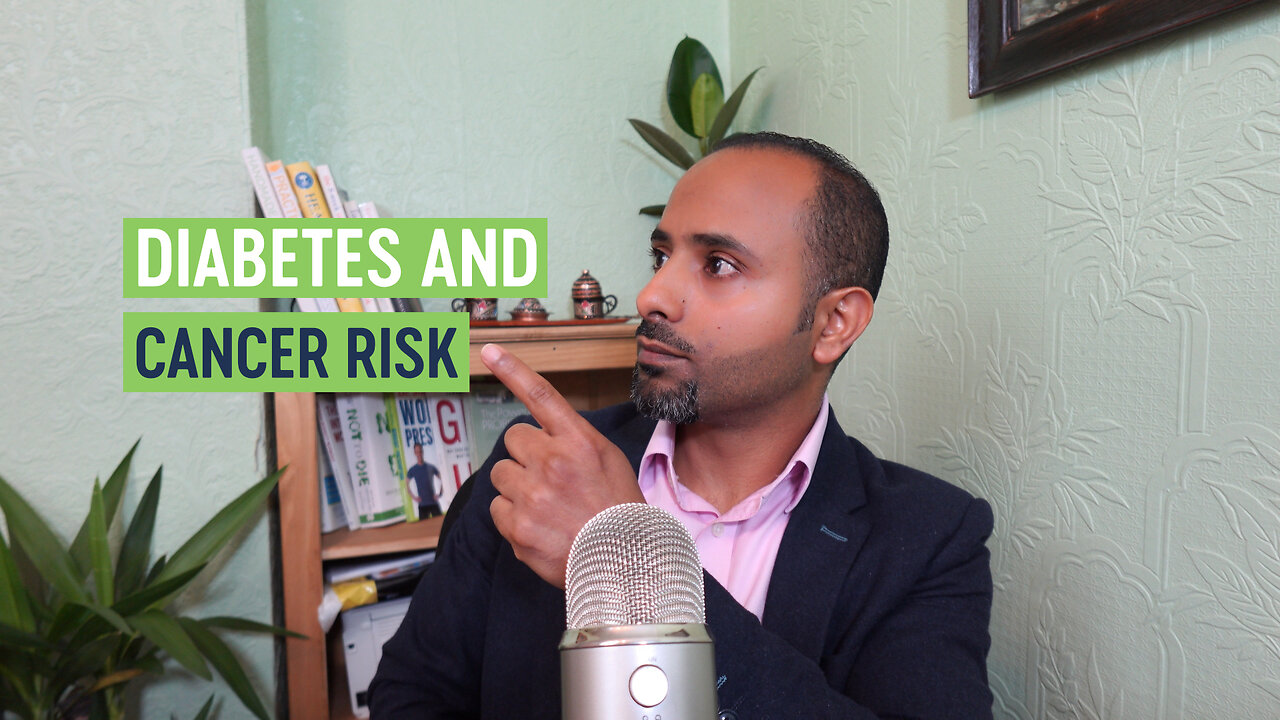Premium Only Content

Breaking the Link: Managing Diabetes to Reduce Cancer Risk
In today's video, I will explore the link between diabetes and cancer and discuss strategies to reduce the risk of developing cancer while managing diabetes.
Diabetes Coaching: https://www.wellnessimpact.org/coaching/
What is type 2 diabetes?
Type 2 diabetes is a health condition that affects how your body metabolises sugar (glucose). It occurs when your body becomes resistant to insulin or doesn't produce enough insulin to regulate blood sugar levels effectively. If left unmanaged, type 2 diabetes can lead to various health complications, including an increased risk of developing cancer.
Did you know that people with type 2 diabetes have a higher risk of developing certain types of cancer? According to some studies, the relationship between diabetes and cancer is complex. Several factors contribute to this connection.
Let's explore some of the key reasons:
• Insulin Resistance: Insulin resistance, a hallmark of type 2 diabetes, can lead to increased insulin and glucose levels in the bloodstream. These elevated levels promote the growth of cancer cells and may increase the risk of developing cancer.
• Chronic Inflammation: Type 2 diabetes is often associated with chronic inflammation in the body. This inflammation can create an environment that supports cancer cell growth and progression.
• Obesity: Obesity is a significant risk factor for both type 2 diabetes and certain types of cancer. Excess body fat can promote insulin resistance, chronic inflammation, and hormonal imbalances, all of which contribute to cancer development.
• Shared Risk Factors: Diabetes and cancer share some common risk factors such as an unhealthy diet, lack of physical activity, smoking, and alcohol consumption. Addressing these risk factors can help reduce the likelihood of developing both conditions.
Some strategies to reduce the risk of developing cancer while managing diabetes.
• Balanced Nutrition: A healthy, balanced diet is crucial for both diabetes management and cancer prevention. Focus on consuming a variety of fruits, vegetables, whole grains, lean proteins, and healthy fats. Minimise or avoid the intake of processed foods and sugary drinks.
• Regular Exercise: Engaging in regular physical activity helps manage blood sugar levels and reduces the risk of cancer. Try to spend at least 150 minutes of moderate-intensity exercise each week. Find activities you enjoy, such as walking, swimming, or cycling, to make it sustainable.
• Weight Management: Maintaining a healthy weight is essential for both diabetes control and cancer prevention. If you're overweight, losing just a small percentage of your body weight can significantly improve your health outcomes. Focus on adopting sustainable lifestyle changes rather than quick-fix diets.
• Quality Sleep: Sleep is often an overlooked aspect of health, but it plays a critical role in managing diabetes and reducing the risk of cancer. Try about 7 hours of quality sleep each night. Establish a bedtime routine, create a sleep-friendly environment, and prioritise restful sleep to support your overall health.
• Stress Management: Chronic stress can negatively impact both diabetes and cancer risk. Explore stress reduction techniques such as meditation, deep breathing exercises, or engaging in hobbies that bring you joy.
• Regular Check-Ups: Don't neglect regular check-ups and tests. These can help detect any potential health issues, including cancer, at an early stage when they're more treatable.
It's important to remember that while having type 2 diabetes may increase your risk of developing cancer, you can take many proactive steps to reduce that risk. You can significantly impact your overall health and wellness by embracing a holistic approach to wellness, focusing on nutrition, exercise, weight management, stress reduction, sleep, and regular check-ups.
Remember, each person's journey is unique, so consult your medical doctor to create a personalised plan that suits your needs.
Join our Facebook group: https://www.facebook.com/groups/wellnessimpact
-
 2:00:58
2:00:58
RealAmericasVoice
9 hours agoWAR ROOM WITH STEVE BANNON AM EDITION
60.1K8 -
 2:59:47
2:59:47
Wendy Bell Radio
8 hours agoAmerica Drops The Gloves
66.5K50 -
 1:22:27
1:22:27
Steven Crowder
3 hours agoGeorge Washington, Our First President | 3 in 3 Special
220K136 -
 1:03:57
1:03:57
Kyle Fortch
4 hours ago $1.01 earnedDJ Chill: DJing For Jelly Roll, SOLD OUT Tour, Performing at Hometown Arena | THE ONE SHEET S1E4
23.7K3 -
![The Deep State Spied On Trump & Sabotaged 2020 Operation To Oust Maduro [EP 4440-8AM]](https://1a-1791.com/video/fwe1/94/s8/1/F/5/k/Z/F5kZx.0kob-small-The-Deep-State-Spied-On-Tru.jpg) 4:05:26
4:05:26
The Pete Santilli Show
15 hours agoThe Deep State Spied On Trump & Sabotaged 2020 Operation To Oust Maduro [EP 4440-8AM]
47.4K3 -
 41:53
41:53
Rethinking the Dollar
2 hours agoHype or Hope? Will THE 50-YEAR FORT KNOX GOLD SCANDAL BE EXPOSED?
19.2K4 -
 1:32:36
1:32:36
Game On!
17 hours ago $9.74 earnedPresident Trump TAKES OVER the Daytona 500!
65.5K13 -
 21:35
21:35
DeVory Darkins
3 days ago $26.40 earnedMitch McConnell TORCHED as Secretary of HHS is sworn in
147K195 -
 1:20:04
1:20:04
Tim Pool
4 days agoGame of Money
193K12 -
 4:48
4:48
Cooking with Gruel
18 hours agoThe Perfect Bacon
32K5